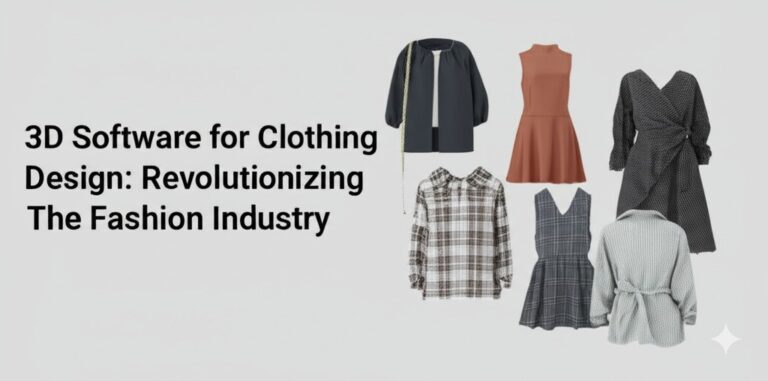The Ultimate Guide to 3D Apparel Design Software: Features, Benefits, and Top Tools
Introduction
The fashion industry is rapidly evolving, and 3D apparel design software is at the forefront of this transformation. With the ability to create realistic digital clothing prototypes, designers can save time, reduce costs, and enhance creativity like never before. Whether you’re a fashion brand, freelance designer, or manufacturer, leveraging 3D fashion design tools can streamline your workflow and improve efficiency.
In this article, we’ll explore the key features, benefits, and top 3D apparel design software options to help you make an informed decision.
What is 3D Apparel Design Software?
3D apparel design software allows designers to create, modify, and visualize clothing designs in a digital environment. These tools simulate fabrics, textures, and garment movements, providing a realistic preview of how apparel will look and function before production.
Key Features of 3D Apparel Design Software
- Virtual Prototyping – Eliminate the need for physical samples by creating accurate 3D renderings.
- Fabric Simulation – Test different materials and textures digitally.
- Pattern Making & Draping – Create and adjust patterns with real-time 3D visualization.
- Seamless Integration – Compatible with other design software like Adobe Illustrator and CAD tools.
- Rendering & Animation – Generate photorealistic images and videos of garments in motion.
Benefits of Using 3D Apparel Design Software
1. Saves Time & Reduces Costs
Traditional fashion design requires multiple physical prototypes, which can be time-consuming and expensive. 3D design software minimizes the need for physical samples, accelerating the design process and reducing waste.
2. Enhances Creativity & Customization
With real-time adjustments and visualization, designers can experiment with different styles, colors, and textures effortlessly. This opens up new avenues for creativity and allows for more personalized designs.
3. Improves Accuracy & Reduces Errors
3D apparel design tools offer precise pattern drafting and garment fitting, reducing errors before production. Designers can ensure better alignment, stitching accuracy, and fabric behavior simulation.
4. Sustainability & Eco-Friendliness
By reducing fabric waste and unnecessary physical samples, 3D fashion design software contributes to sustainable fashion practices. Many brands use these tools to reduce their carbon footprint and promote ethical production.
5. Enhanced Collaboration & Remote Work
Many 3D apparel design programs offer cloud-based solutions, enabling designers, manufacturers, and retailers to collaborate remotely and share real-time updates.
Top 3D Apparel Design Software in 2024
1. CLO 3D
Best for: Professional designers & brands
CLO 3D is one of the most popular fashion design software tools, offering advanced fabric simulation, real-time 3D draping, and seamless integration with pattern-making software. It’s widely used by industry leaders to create ultra-realistic virtual clothing prototypes.
Key Features:
- AI-powered fabric simulation
- 3D pattern-making tools
- Real-time garment visualization
2. Browzwear
Best for: Fashion brands & manufacturers
Browzwear offers a powerful suite of tools that help brands streamline the entire fashion production process. With true-to-life garment visualization and easy integration with PLM systems, it’s a favorite for major apparel brands.
Key Features:
- Seamless CAD compatibility
- True-to-life fabric simulation
- 3D-to-2D pattern conversion
3. Marvelous Designer
Best for: High-detail 3D garment creation
Marvelous Designer is highly favored by digital fashion creators and game designers. It allows users to create stunning 3D clothing with realistic folds, wrinkles, and draping effects.
Key Features:
- High-detail fabric physics engine
- Intuitive UI for quick design adjustments
- Ideal for fashion, gaming, and animation
4. TUKA3D
Best for: Apparel manufacturers
TUKA3D is a powerful virtual fitting and visualization tool designed specifically for mass garment production. It ensures that patterns are production-ready and helps optimize fabric usage.
Key Features:
- Virtual fit testing with avatars
- Integrated with CAD tools
- 3D-to-2D conversion for production
How to Choose the Right 3D Apparel Design Software
When selecting the best 3D fashion design software, consider the following factors:
- Purpose & Industry Fit: Are you designing for fashion brands, gaming, or animation?
- Ease of Use: Does the software have a user-friendly interface?
- Feature Set: Does it offer fabric simulation, pattern making, and rendering?
- Integration: Is it compatible with other tools like CAD or PLM systems?
- Pricing & Subscription Model: Does it fit your budget and business needs?
Conclusion
The fashion industry is embracing digital transformation, and 3D apparel design software is playing a crucial role in shaping its future. Whether you’re a seasoned designer or just starting, adopting 3D tools can enhance creativity, improve efficiency, and promote sustainable fashion practices.
Ready to revolutionize your design process? Explore the top 3D fashion design software options and take your creations to the next level!

Zain Jacobs is a writer for TheNetUse, providing in-depth reviews, tips, and insights on the latest software apps to help users maximize their digital experience.







